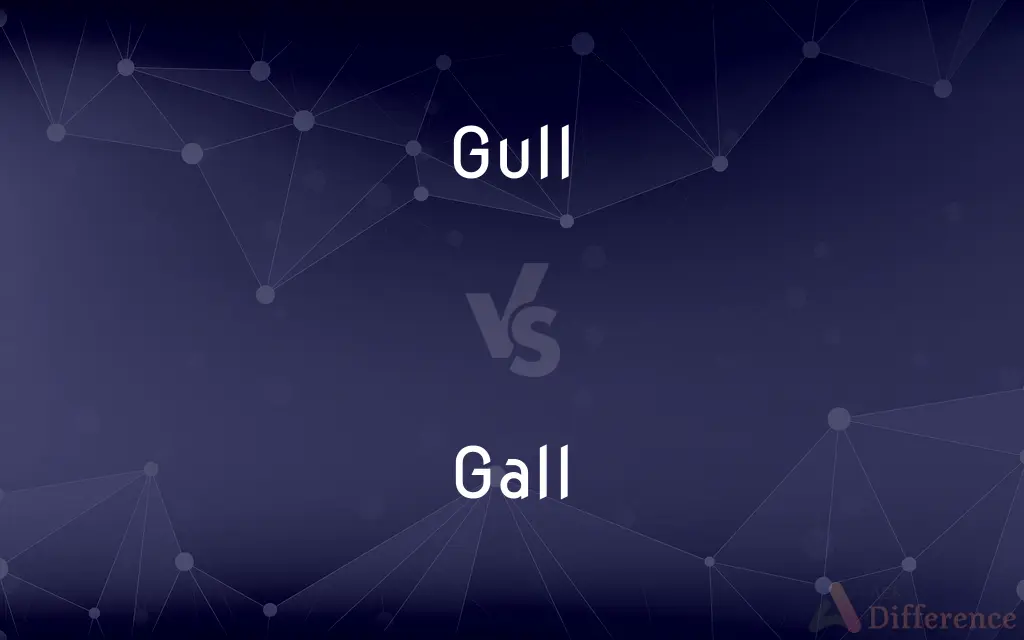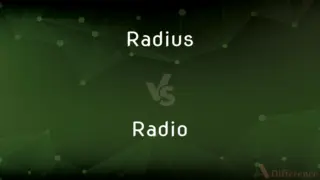Gull vs. Gall — What's the Difference?
By Maham Liaqat & Fiza Rafique — Updated on April 30, 2024
A "gull" is a bird typically found near seas, rivers, and lakes, known for its scavenging habits, while "gall" refers to bold, impudent behavior or can denote a growth on plants caused by insects.

Difference Between Gull and Gall
Table of Contents
ADVERTISEMENT
Key Differences
Gulls are seabirds belonging to the family Laridae, widely recognized for their adaptability and omnivorous diet, often seen scavenging. They are typically medium to large birds, usually grey or white, with black markings on the head or wings. On the other hand, gall has two primary meanings: one being a kind of abrasiveness or audacity in behavior, and the other a botanical term referring to abnormal growths on plants, often caused by parasitic insects or mites.
While gulls are known for their intelligence and complex social behavior, often observed working together to find food, gall in the behavioral sense refers to someone acting with brazenness or disrespect, which is a human social trait rather than an avian one. Conversely, in botanical terms, gall is a response of the plant tissue to irritation or damage, typically forming a tumor-like structure that provides a habitat for the pest.
Gulls are found in a variety of habitats but are most commonly associated with coastal areas, reflecting their evolution and dietary preferences. Galls, however, can be found on numerous plant species worldwide, affecting everything from eucalyptus to oak trees, depending on the specific parasites and environmental conditions.
The reproductive strategies of gulls, which often involve nesting in colonies and showing high parental care, contrast with the way galls are formed—through the exploitation of the plant's resources by an external agent (like insects), which manipulates plant growth to create a protective and nourishing environment for its larvae.
The study of gulls falls within ornithology, a branch of zoology, which includes monitoring their migration patterns and impact on ecosystems. The study of galls, however, is part of botany and entomology, focusing on plant pathology and the interactions between plants and insect parasites.
ADVERTISEMENT
Comparison Chart
Definition
A bird of the Laridae family
Bold behavior or plant growth caused by insects
Habitat
Coastal areas, lakes, rivers
Plants affected by certain insects
Study Field
Ornithology
Botany, Entomology
Social Behavior
Complex, often in colonies
N/A (behavioral); parasitic (botanical)
Reproductive Strategy
Nesting in colonies, high parental care
Parasitic insects manipulate plant growth
Compare with Definitions
Gull
Often seen in large, noisy colonies, especially during breeding season.
The island's cliffs were dotted with gull nests.
Gall
Bold, impudent behavior; the audacity to behave brazenly.
His gall in handling the objections was noted by all.
Gull
A bird commonly found near water, known for its scavenging habits.
The gull swooped down to snatch a piece of bread.
Gall
A pathological growth or swelling in plants.
The biologist studied the effects of gall formations on native plants.
Gull
Seabirds that are typically grey or white with varied markings.
We observed several gulls resting along the shoreline.
Gall
Also used metaphorically to describe something irritating.
It galled him to admit that he was wrong.
Gull
Known for their loud squawking and social nature.
The noisy gulls gathered around the fishermen returning with their catch.
Gall
A growth on plants caused by insect larvae or mites.
The oak tree was covered in galls, caused by gall wasps.
Gull
Feeds on a wide range of foods, including fish and human food waste.
Gulls are versatile eaters, often seen scavenging at beaches.
Gall
Referring to irritation or bitterness in character.
She spoke with a gall that surprised those who knew her mild manner.
Gull
Gulls, or colloquially seagulls, are seabirds of the family Laridae in the suborder Lari. They are most closely related to the terns (family Sternidae) and only distantly related to auks, skimmers and even more distantly to waders.
Gall
Galls (from Latin galla, 'oak-apple') or cecidia (from Greek kēkidion, anything gushing out) are a kind of swelling growth on the external tissues of plants, fungi, or animals. Plant galls are abnormal outgrowths of plant tissues, similar to benign tumors or warts in animals.
Gull
Any of various chiefly coastal seabirds of the family Laridae, having long wings, webbed feet, a thick, slightly hooked beak, and usually gray and white plumage.
Gall
Outrageous insolence; effrontery
After borrowing my car, he had the gall to complain about its seats.
Gull
A person who is easily tricked or cheated; a dupe.
Gall
Bitterness of feeling; rancor.
Gull
To deceive or cheat.
Gall
Something bitter to endure
The gall of defeat.
Gull
A seabird of the genus Larus or of the family Laridae.
Gall
See bile.
Gull
Any of various pierid butterflies of the genus Cepora.
Gall
A skin sore caused by friction and abrasion
A saddle gall.
Gull
(slang) A cheating trick; a fraud.
Gall
Exasperation; vexation.
Gull
One easily cheated; a dupe.
Gall
The cause of such vexation.
Gull
A swindler or trickster.
Gall
An abnormal growth of plant tissue caused by an organism, such as an insect, mite, or bacterium, or by a wound.
Gull
To deceive or cheat.
Gall
To irk or exasperate; vex
It galled me to have to wait outside.
Gull
To mislead.
Gall
To wear away or make sore by abrasion; chafe:
Gull
To trick and defraud.
Gall
To become worn or sore by abrasion.
Gull
To deceive; to cheat; to mislead; to trick; to defraud.
The rulgar, gulled into rebellion, armed.
I'm not gulling him for the emperor's service.
Gall
(anatomy) The gall bladder.
Gull
A cheating or cheat; trick; fraud.
Gall
(uncountable) A feeling of exasperation.
Gull
One easily cheated; a dupe.
Gall
(uncountable) Impudence or brazenness; temerity, chutzpah.
Gull
One of many species of long-winged sea birds of the genus Larus and allied genera.
Gall
(countable) A sore on a horse caused by an ill-fitted or ill-adjusted saddle; a saddle sore.
Gull
A person who is gullible and easy to take advantage of
Gall
(countable) A pit on a surface being cut caused by the friction between the two surfaces exceeding the bond of the material at a point.
Gull
Mostly white aquatic bird having long pointed wings and short legs
Gall
Bile, especially that of an animal; the greenish, profoundly bitter-tasting fluid found in bile ducts and gall bladders, structures associated with the liver.
Gull
Make a fool or dupe of
Gall
Great misery or physical suffering, likened to the bitterest-tasting of substances.
Gull
Fool or hoax;
The immigrant was duped because he trusted everyone
You can't fool me!
Gall
A sore or open wound caused by chafing, which may become infected, as with a blister.
Gall
A blister or tumor-like growth found on the surface of plants, caused by burrowing of insect larvae into the living tissues, especially that of the common oak gall wasp Cynips quercusfolii.
Gall
(countable) A bump-like imperfection resembling a gall.
Gall
(transitive) To bother or trouble.
Gall
To harass, to harry, often with the intent to cause injury.
Gall
To chafe, to rub or subject to friction; to create a sore on the skin.
Gall
To exasperate.
Gall
To cause pitting on a surface being cut from the friction between the two surfaces exceeding the bond of the material at a point.
Improper cooling and a dull milling blade on titanium can gall the surface.
Gall
To scoff; to jeer.
Gall
To impregnate with a decoction of gallnuts in dyeing.
Gall
The bitter, alkaline, viscid fluid found in the gall bladder, beneath the liver. It consists of the secretion of the liver, or bile, mixed with that of the mucous membrane of the gall bladder.
Gall
The gall bladder.
Gall
Anything extremely bitter; bitterness; rancor.
He hath . . . compassed me with gall and travail.
Comedy diverted without gall.
Gall
Impudence; brazen assurance.
Gall
An excrescence of any form produced on any part of a plant by insects or their larvae. They are most commonly caused by small Hymenoptera and Diptera which puncture the bark and lay their eggs in the wounds. The larvae live within the galls. Some galls are due to aphids, mites, etc. See Gallnut.
Gall
A wound in the skin made by rubbing.
Gall
To impregnate with a decoction of gallnuts.
Gall
To fret and wear away by friction; to hurt or break the skin of by rubbing; to chafe; to injure the surface of by attrition; as, a saddle galls the back of a horse; to gall a mast or a cable.
I am loth to gall a new-healed wound.
Gall
To fret; to vex; as, to be galled by sarcasm.
They that are most galled with my folly,They most must laugh.
Gall
To injure; to harass; to annoy; as, the troops were galled by the shot of the enemy.
In our wars against the French of old, we used to gall them with our longbows, at a greater distance than they could shoot their arrows.
Gall
To scoff; to jeer.
Gall
An open sore on the back of a horse caused by ill-fitting or badly adjusted saddle
Gall
A skin sore caused by chafing
Gall
Abnormal swelling of plant tissue caused by insects or microorganisms or injury
Gall
A feeling of deep and bitter anger and ill-will
Gall
A digestive juice secreted by the liver and stored in the gallbladder; aids in the digestion of fats
Gall
The trait of being rude and impertinent; inclined to take liberties
Gall
Become or make sore by or as if by rubbing
Gall
Irritate or vex;
It galls me that we lost the suit
Common Curiosities
What is a gull?
A gull is a type of bird, commonly found near bodies of water, known for its scavenging behavior and adaptability.
What does gall mean in human behavior?
Gall refers to a bold, impudent attitude or behavior, often considered disrespectful.
Can all plants develop galls?
Many plants can develop galls, but it largely depends on the presence of specific insects or mites that induce these growths.
What are the typical habitats for gulls?
Gulls are versatile and can inhabit a range of environments from sandy beaches and coastal waters to inland garbage dumps and agricultural fields.
What challenges do gulls face in their natural habitats?
Challenges include habitat loss due to human development, pollution, and competition for food resources with other wildlife and humans.
Are gulls aggressive animals?
Gulls can be aggressive, especially when defending their territory or young, or when competing for food.
How do gulls communicate with each other?
Gulls communicate through a variety of vocalizations and body signals, especially during mating rituals and when signaling danger.
What are the migration patterns of gulls?
Some gull species migrate long distances between breeding and wintering grounds, while others remain in the same general area year-round.
What is the ecological role of galls?
Galls can provide food and shelter for the insects that induce them and other species, influencing local biodiversity and the health of plant populations.
Do galls harm the plants they form on?
While galls can stress plants by diverting resources, most plants tolerate them well. However, severe infestations can weaken plants, making them more susceptible to other stresses.
How can one identify different types of galls?
Galls can be identified by their size, shape, and location on the plant, as well as the type of plant they are found on. Knowledge of local insect species also helps.
Are there beneficial aspects to galls?
Yes, galls can increase biodiversity by providing habitats for various insects and other organisms, and they can also spur genetic diversity in plants.
How do gulls adapt to urban environments?
Gulls have adapted well to urban areas by exploiting plentiful food sources such as landfill sites, street food waste, and fishing industry by-products.
What triggers gall formation in plants?
Gall formation is usually triggered by chemicals secreted by invading insects or mites as they lay eggs or feed on the plant tissues.
Share Your Discovery

Previous Comparison
Radius vs. Radio
Next Comparison
Sallow vs. WanAuthor Spotlight
Written by
Maham LiaqatCo-written by
Fiza RafiqueFiza Rafique is a skilled content writer at AskDifference.com, where she meticulously refines and enhances written pieces. Drawing from her vast editorial expertise, Fiza ensures clarity, accuracy, and precision in every article. Passionate about language, she continually seeks to elevate the quality of content for readers worldwide.
















































